Life Got Hot
Well the rainy season is over, and so it is hot. Rainy season runs from Aug-Sept, and again for some time in the spring, and who knew it would be so punctual. Oct. 1st it got hot and stopped raining at night. When that rainy season began the water level in Lake Volta was four feet below the minimum for Akosombo Dam. Low water means energy crisis in Ghana. Energy crisis in Ghana means Load Shedding. I don’t know where the term Load Shedding comes from, I would think the word should be load sharing, like we’re sharing the energy load but whatever, it means for us that every three and a half days we are 12 hours without power , or as they say here, “The light is off”. Today the water level is three feet above the minimum, so the Load what-ever-ing should be over, except it isn’t, in fact we’re getting some “bonus” days, like today, which is not our day and yet the light is off.
When we first arrived, which was in August (the coolest month of the year), one of the professors at Ashesi asked Suzanne how we were adjusting to the heat. Suzanne gives the standard answer, “Well, we’re from Texas, so we’re used to it.”
“So did you expect it to be hotter?” he asks.
“Well, yes” Suzanne answers.
“Don’t worry,” he says with a smile, “it will.” Today we are beginning to see what he means.
We live in a section of town called Labone (La-bone-ee). I gather at one point this whole area was known as La. The village of La still exists, it is where our day guard Emmanuel lives, and he takes me there weekly for something, so I am beginning to know its streets. It is a paved Ghanaian village and very different from what it looks like from the road. The Colonial Masters (read: The British) built in this part of La, and so over the years it became known as La-Obrunie, (or La-White Man) and over the years the name was shortened to Labone. Because the colonial masters lived here, and in fact built the house we live in, the houses are large by Accra standards and come with servants quarters and, these days, air conditioners. I say large by Accra standards because there is a newer section of town called East Legon, and these houses are gigantic, even by Texas standards. I’m not kidding, they make our McMansions look like hovels, these houses can be 100,000 square feet. It isn’t that there are lots of bedrooms as much as multiple living areas and enormous entry ways, halls and kitchens, lots of servants rooms, and then there are the courtyards. But in Labone, the houses are older, smaller (O.K., we’re talking relative terms here), and have been refitted with air conditioning units, which so far we have not used much. We could use them, but the house is airy and gets good air flow (read: I’m cheap). Plus when they are running, it does not feel like we are really living in Africa (read: I’m rationalizing). But we’re still early into this hot season, so we may break down.
Because we live in Labone and because there are many air conditioners here, we’re told that the light goes out here more frequently than some other places in Accra because there is a higher load on the system. We’re also told that load shedding will end in early November, but we all know that it is just the schedule that will end – the light will still go out, we just won’t have the schedule to be able to plan for it (like mid-load of laundry and Grace really needs that soccer uniform, or mid-dinner and you made enough for good leftovers but now you can’t open the fridge to store them).
I think a lot about the American Bubble in Ghana (what I could also call the Air Conditioned Bubble). Last week I was in conversation with one of my kid’s teachers. “Well,” I say, “I bet life is quite different than what you were expecting when you were growing up.” It is the kind of almost self congratulatory conversations we get into here, but she has thought this thing through and says: “No, not really.”
Her reply surprises me. “When you look at the details of my life here, they are not all that different from the US. I live in a nice home, I teach at a good school, I shop in a supermarket, I have to commute to work, I’m a mother to two kids, and my husband works. How different is that from the US?”
“OK, so maybe its just the location that is different,” I say. But it got me thinking about this Bubble that we live on the edge of. Among more experienced African travelers, Ghana is called “Africa Lite”, because it is so much easier than really living in Africa (I’m guessing what Austin is to Texas, Ghana is to Africa). Africa 101, or Intro to Africa are its other names.
Of course things sound much more exotic than they really are. We have guards, we have household help (cleans the house daily, does dishes, and washes, folds and irons the cloths), we have a vehicle (at least for a few more months). And there are things my kids remind me that we don’t have, like cable TV and DSL internet, like bacon, and AC (at least right now).
“What is the point of living in Africa,” I say in my Father Knows Best voice “if life is indistinguishable from life in the States?” or “I mean we’re only here for a year, why not make the most of it?” This is a weekly, if not daily, conversation about AC, cable TV or home internet and so far I seem to be making my point, but still, we are in the more cool months, and they want this stuff, what is going to happen during the hot, and then hot and dusty seasons?
So this week, life got hot and so we went to the beach. Actually it was the beginning of fall break for my kids, and we, along with several other missionary families, went to Anamambo Beach Resort. Now Anamombo is more primitive that the other resorts we have been to and so it doesn’t offer air conditioning in every room, and the rooms don’t come with TVs. You go to this resort to hang out at the beach, and eat great seafood. These missionary families work for many of the different societies (The Mission Society; Rafiki Foundation; Compassion International; Methodist University College of Ghana; ) and being around them makes me appreciate how hard they work, and the depth of their calling. It isn’t an easy life for them or their families (even with the occasional week-end at the beach) .
There is a missionary family who arrived about the same time we did here with two kids, roughly the same ages of our first and last. I have been talking with them and observing the husband and wife, who both left highly successful and demanding jobs in the states to enter the mission field. “Am I too called?” I wonder. Do I have the spiritual gift of missionary? Everything I know about spiritual gifts tells me no, I’m not called and knowing this and yet still wanting to be is a teaching moment for me to learn about one of the darker sides of Spiritual Gifts. That dark side is “gift envy” whereby you want to have a certain gift, but don’t.
“So what does that feel like to you?” I ask. One of our missionary friends has a deep desire to leave Africa Lite, to live in a restricted country. Restricted country means missionary work is illegal, I’m figuring a Muslim country. They would go there to do what they do and live not so public lives as Christ followers. They both have transferable jobs, teachers, CPA, MBA, language skills… and so finding work in the country would be easy. “But not now,” he says. “I would never take my family there.” He knows, he is the product of Missionary parents, he is an MK (or Missionary Kid).
MKs are like PKs (Preacher’s Kids) in that they grow up in the church (or mission field). I gather MKs do not have the wild reputation that PKs have earned, but their childhood was not without its scars. “We grew up with nothing,” one MK-now parent told me. “I saw all this wealth around us and we had nothing. We were poor, and I didn’t want my kids to have to deal with all that.” There is a hint of bitterness in his voice, and so together with his wife (also an MK) they have made a choice to live just inside the American bubble. He doesn’t want his kids growing up thinking they were poor, and wanting all that stuff. This conversations makes me wonder about our choices, and they are choices. We could live in AC, and eat American food, and use up much of our savings living deeper in the American bubble, but what would we have to show for it in a year?
We joke, “kids got to have something to talk about in therapy… might as well be this,” but there is a deeper question that is wrapped around this whole calling thing. “So what is your heart’s desire?” I’m now at lunch with the pastor of the church. “To reach nominal Christians,” I hear myself say “so that maybe Jesus will become real to them.” It isn’t an answer I’ve used before, but it pretty much sums up what drove my ministry as a pastor. It is a different calling than the missionary one, which is sharing the gospel to those who do not know Jesus. When I think about doing that, I’m not sure where to even begin to share the gospel.
While we were in Anamombo, we went to a festival they were having there, and toured the local Slave Fort. This is the third we’ve seen and each share rather depressing common elements, like “the door of no return,” the holding cells, the “governor’s choosing balcony,” where he would pick out a female slave to pleasure himself. This castle is no different, but it had not been restored to the extent that the others had. There are two things I’ll remember about it, the first was the vultures. It was near the end of the tour and perched above the governor’s quarters were two vultures. I wondered if they are perch here out of an inherited memory of this castle, somehow knowing it used to provide much food from the slaves that didn’t make it. It reminded me of a story I once heard about the Atlantic route the slave ships sailed. Even today on that stretch of water there is a higher percentage of sharks than anywhere else and scientists conclude it is the inherited memory of the rich feeding grounds as slave ships tossed the dead bodies overboard. Is this just like for the vultures? The second thing I’ll remember is how the castle is used today, as a Youth Center, I gather it has been used this way for a number of years. It reminds me of the old testament story of Joseph, how he forgives his brothers saying: “Even though you intended to do harm to me, God intended it for good, in order to preserve a numerous people, as he is doing today.” It feels better somehow knowing that within these walls—that were built for evil—that God is doing some good in for the next generation of youth.
Sometime after returning from the week-end, I (Steve) got sick just as Suzanne had gotten sick when we went to Cape Coast. “We have to figure out how to leave town without getting sick!” Suzanne says. I must say that being sick like this changes my relationship with Ghana knowing first hand the danger that lays (or is it lies) in every bite. It makes Ghana feel less safe to me, and has taken the wind out of my adventuresome spirit.
When we first arrived, which was in August (the coolest month of the year), one of the professors at Ashesi asked Suzanne how we were adjusting to the heat. Suzanne gives the standard answer, “Well, we’re from Texas, so we’re used to it.”
“So did you expect it to be hotter?” he asks.
“Well, yes” Suzanne answers.
“Don’t worry,” he says with a smile, “it will.” Today we are beginning to see what he means.
We live in a section of town called Labone (La-bone-ee). I gather at one point this whole area was known as La. The village of La still exists, it is where our day guard Emmanuel lives, and he takes me there weekly for something, so I am beginning to know its streets. It is a paved Ghanaian village and very different from what it looks like from the road. The Colonial Masters (read: The British) built in this part of La, and so over the years it became known as La-Obrunie, (or La-White Man) and over the years the name was shortened to Labone. Because the colonial masters lived here, and in fact built the house we live in, the houses are large by Accra standards and come with servants quarters and, these days, air conditioners. I say large by Accra standards because there is a newer section of town called East Legon, and these houses are gigantic, even by Texas standards. I’m not kidding, they make our McMansions look like hovels, these houses can be 100,000 square feet. It isn’t that there are lots of bedrooms as much as multiple living areas and enormous entry ways, halls and kitchens, lots of servants rooms, and then there are the courtyards. But in Labone, the houses are older, smaller (O.K., we’re talking relative terms here), and have been refitted with air conditioning units, which so far we have not used much. We could use them, but the house is airy and gets good air flow (read: I’m cheap). Plus when they are running, it does not feel like we are really living in Africa (read: I’m rationalizing). But we’re still early into this hot season, so we may break down.
Because we live in Labone and because there are many air conditioners here, we’re told that the light goes out here more frequently than some other places in Accra because there is a higher load on the system. We’re also told that load shedding will end in early November, but we all know that it is just the schedule that will end – the light will still go out, we just won’t have the schedule to be able to plan for it (like mid-load of laundry and Grace really needs that soccer uniform, or mid-dinner and you made enough for good leftovers but now you can’t open the fridge to store them).
I think a lot about the American Bubble in Ghana (what I could also call the Air Conditioned Bubble). Last week I was in conversation with one of my kid’s teachers. “Well,” I say, “I bet life is quite different than what you were expecting when you were growing up.” It is the kind of almost self congratulatory conversations we get into here, but she has thought this thing through and says: “No, not really.”
Her reply surprises me. “When you look at the details of my life here, they are not all that different from the US. I live in a nice home, I teach at a good school, I shop in a supermarket, I have to commute to work, I’m a mother to two kids, and my husband works. How different is that from the US?”
“OK, so maybe its just the location that is different,” I say. But it got me thinking about this Bubble that we live on the edge of. Among more experienced African travelers, Ghana is called “Africa Lite”, because it is so much easier than really living in Africa (I’m guessing what Austin is to Texas, Ghana is to Africa). Africa 101, or Intro to Africa are its other names.
Of course things sound much more exotic than they really are. We have guards, we have household help (cleans the house daily, does dishes, and washes, folds and irons the cloths), we have a vehicle (at least for a few more months). And there are things my kids remind me that we don’t have, like cable TV and DSL internet, like bacon, and AC (at least right now).
“What is the point of living in Africa,” I say in my Father Knows Best voice “if life is indistinguishable from life in the States?” or “I mean we’re only here for a year, why not make the most of it?” This is a weekly, if not daily, conversation about AC, cable TV or home internet and so far I seem to be making my point, but still, we are in the more cool months, and they want this stuff, what is going to happen during the hot, and then hot and dusty seasons?
So this week, life got hot and so we went to the beach. Actually it was the beginning of fall break for my kids, and we, along with several other missionary families, went to Anamambo Beach Resort. Now Anamombo is more primitive that the other resorts we have been to and so it doesn’t offer air conditioning in every room, and the rooms don’t come with TVs. You go to this resort to hang out at the beach, and eat great seafood. These missionary families work for many of the different societies (The Mission Society; Rafiki Foundation; Compassion International; Methodist University College of Ghana; ) and being around them makes me appreciate how hard they work, and the depth of their calling. It isn’t an easy life for them or their families (even with the occasional week-end at the beach) .
There is a missionary family who arrived about the same time we did here with two kids, roughly the same ages of our first and last. I have been talking with them and observing the husband and wife, who both left highly successful and demanding jobs in the states to enter the mission field. “Am I too called?” I wonder. Do I have the spiritual gift of missionary? Everything I know about spiritual gifts tells me no, I’m not called and knowing this and yet still wanting to be is a teaching moment for me to learn about one of the darker sides of Spiritual Gifts. That dark side is “gift envy” whereby you want to have a certain gift, but don’t.
“So what does that feel like to you?” I ask. One of our missionary friends has a deep desire to leave Africa Lite, to live in a restricted country. Restricted country means missionary work is illegal, I’m figuring a Muslim country. They would go there to do what they do and live not so public lives as Christ followers. They both have transferable jobs, teachers, CPA, MBA, language skills… and so finding work in the country would be easy. “But not now,” he says. “I would never take my family there.” He knows, he is the product of Missionary parents, he is an MK (or Missionary Kid).
MKs are like PKs (Preacher’s Kids) in that they grow up in the church (or mission field). I gather MKs do not have the wild reputation that PKs have earned, but their childhood was not without its scars. “We grew up with nothing,” one MK-now parent told me. “I saw all this wealth around us and we had nothing. We were poor, and I didn’t want my kids to have to deal with all that.” There is a hint of bitterness in his voice, and so together with his wife (also an MK) they have made a choice to live just inside the American bubble. He doesn’t want his kids growing up thinking they were poor, and wanting all that stuff. This conversations makes me wonder about our choices, and they are choices. We could live in AC, and eat American food, and use up much of our savings living deeper in the American bubble, but what would we have to show for it in a year?
We joke, “kids got to have something to talk about in therapy… might as well be this,” but there is a deeper question that is wrapped around this whole calling thing. “So what is your heart’s desire?” I’m now at lunch with the pastor of the church. “To reach nominal Christians,” I hear myself say “so that maybe Jesus will become real to them.” It isn’t an answer I’ve used before, but it pretty much sums up what drove my ministry as a pastor. It is a different calling than the missionary one, which is sharing the gospel to those who do not know Jesus. When I think about doing that, I’m not sure where to even begin to share the gospel.
While we were in Anamombo, we went to a festival they were having there, and toured the local Slave Fort. This is the third we’ve seen and each share rather depressing common elements, like “the door of no return,” the holding cells, the “governor’s choosing balcony,” where he would pick out a female slave to pleasure himself. This castle is no different, but it had not been restored to the extent that the others had. There are two things I’ll remember about it, the first was the vultures. It was near the end of the tour and perched above the governor’s quarters were two vultures. I wondered if they are perch here out of an inherited memory of this castle, somehow knowing it used to provide much food from the slaves that didn’t make it. It reminded me of a story I once heard about the Atlantic route the slave ships sailed. Even today on that stretch of water there is a higher percentage of sharks than anywhere else and scientists conclude it is the inherited memory of the rich feeding grounds as slave ships tossed the dead bodies overboard. Is this just like for the vultures? The second thing I’ll remember is how the castle is used today, as a Youth Center, I gather it has been used this way for a number of years. It reminds me of the old testament story of Joseph, how he forgives his brothers saying: “Even though you intended to do harm to me, God intended it for good, in order to preserve a numerous people, as he is doing today.” It feels better somehow knowing that within these walls—that were built for evil—that God is doing some good in for the next generation of youth.
Sometime after returning from the week-end, I (Steve) got sick just as Suzanne had gotten sick when we went to Cape Coast. “We have to figure out how to leave town without getting sick!” Suzanne says. I must say that being sick like this changes my relationship with Ghana knowing first hand the danger that lays (or is it lies) in every bite. It makes Ghana feel less safe to me, and has taken the wind out of my adventuresome spirit.

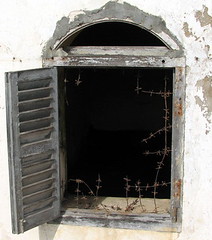
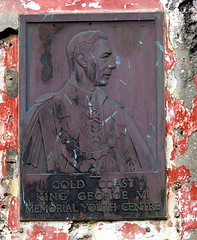
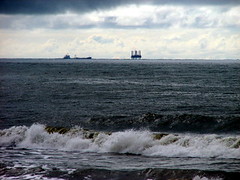
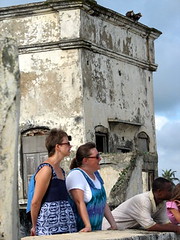
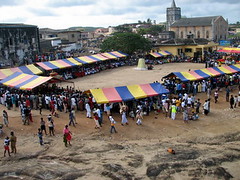
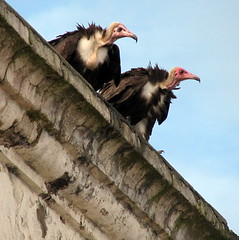
0 Comments:
Post a Comment
<< Home